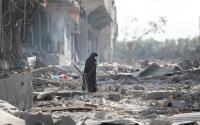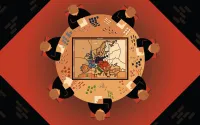20 December 2006Peter Popham
Why are we asking this question now?
Because yesterday the five Bulgarian nurses and the Palestinian doctor were, for the second time, sentenced to death by a Libyan court. The verdict was a carbon copy of that handed down by the court in the first trial in May 2004. The foreigners appealed to the Supreme Court and on Christmas Day 2005 the court accepted the appeal and ordered a retrial. The foreign health workers have now been in prison in Libya for nearly seven years, much of that time in degrading conditions. The trial has become by far the longest and most heavily politicised legal process in Libya's history.
What is their alleged crime?
Almost too horrible to describe: deliberately pumping HIV-infected blood into the veins of hundreds of small Libyan boys and girls. Fifty-two children have died since the epidemic began. Some of the surviving children have tuberculosis and other Aids-related diseases, though the condition of many of the others has stabilised thanks to anti-retroviral medication. Many of the children are being treated at hospitals in Italy and France thanks to funding from the EU.
Why are we calling it 'alleged'?
Because nobody outside Libya believes there is the slightest reason to think they are guilty. The nurses belonged to a larger group of Bulgarians who took up their contracts at Al-Fatih government hospital in Benghazi, Libya's second city, in March 1998. Then in February of the next year, 23 Bulgarians working at the hospital were arrested, six of whom, along with the Palestinian, were held incommunicado for months, while the rest were released.
Those held were initially charged with "committing actions leading to the uncontrolled murder of people with the aim of undermining state security" , in a plot that the Libyan authorities claimed had been dreamed up by the CIA and Mossad. The charge of which they were convicted yesterday was " deliberately causing an Aids epidemic by injecting over 400 children with harmful micro-organisms", which also carries the death penalty.
On what evidence were they convicted?
The only evidence against them is a report that was hurriedly compiled by five Libyan doctors and which contains no data, only anecdotes. The court refused to hear witnesses in defence of the medical staff, and rejected requests for new inquiries into the HIV outbreak. The report by Aids experts Luc Montagnier and Vittorio Colizzi submitted to the original trial, which indicated that the epidemic was caused by poor hygiene - needles washed under the tap - and began before the Bulgarians arrived, was discounted. A new report published in Nature last week indicates that the outbreak stemmed from a single HIV-positive child under treatment in the hospital who had been infected by his mother; the virus, the report claims, was already present in the hospital in 1997. But the court did not wish to know.
What do the nurses say?
One of the accused, Christiana Valcheva, told the court: "No doctor or nurse would dare commit such a dreadful crime."
All claim innocence, and insist that their confessions were tortured out of them. They brought a civil suit against their 10 alleged torturers, which was thrown out by a Tripoli court last year, and they were not allowed to appeal that verdict to the Supreme Court, nor to tell the new trial about what had happened to them. The nurses were once again obliged at the retrial to hear the confessions that had been extracted from them by beatings and electric shocks employed to send them to the firing squad.
Has the international community done much to help?
It has done quite a bit. The case is embarrassing all round because while in 1999, when it started, Libya was still an international pariah and nobody was surprised to hear Colonel Muammar Gaddafi making exotic allegations about CIA/Mossad conspiracies, since giving up the bomb in 2003 he has been making a ponderous return from the cold. This case has made the process more difficult.
Since the original guilty verdict, the Council of the European Union has invited Libya to join the Barcelona Process - the EU-funded initiative to bring its Mediterranean neighbours into a closer political, economic and cultural relationship, intended to culminate in a free-trade zone - in exchange for dropping the case against the Bulgarians.
In November 2004, the European Commission launched a Benghazi Aids Action Plan which has so far received €2m in EU money. Last year Colonel Gaddafi offered to drop the case on payment by Bulgaria of €10m for each infected child's family. Bulgaria rejected the proposal, but in December set up its own international fund to help Libya combat Aids.
And there is probably more going on behind the scenes: last Friday David Welch, an American Assistant Secretary of State who helped negotiate the resumption of diplomatic relations between Libya and the US, arrived in Tripoli to discuss "issues which hinder improvements in relations" , according to the Libyan news agency Jana. No details were released. Welch has previously called for the nurses to be allowed to go home, and yesterday Washington said it was "disappointed" with the trial verdict.
Why doesn't Gaddafi commute the sentences?
Benghazi is the centre of opposition to his dictatorial regime, and the Aids epidemic has become a focus of mass popular anger. The idea propagated by Colonel Gaddafi himself that the epidemic was caused by the Bulgarians acting on the orders of foreign intelligence agencies was repeated verbatim at a press conference in London on Monday by the president of a group representing the victims.
But if he is looking for a way of taking revenge on the West for the loss of face (and dollars) inflicted over the Lockerbie bombing, then the closer the Bulgarians get to the firing squad, the harder the bargain he will be able to drive. There are still two legal steps the foreigners can take before they run out of options, first the Supreme Court, second the so-called " high judicial council" described yesterday by Libya's justice minister Ali Hasnaoui as senior to the Supreme Court. Whatever those bodies may decide, the real horse-trading should be starting about now.
Will these health workers ever return home?
Yes...
* They will, if the European Union, which admits Bulgaria in January, is willing to foot a monstrous bill
* They will, if David Welch, the US Assistant Secretary of State, has a card up his sleeve that no one knows about
* They will, if Gaddaffi is adroit enough to be able to persuade the outraged mothers and fathers of Benghazi that the departure of the " murderers" of their children is other than a bitter defeat
No...
* They won't, if Gaddaffi considers that Libya is too important an ally to be discarded and the EU's bribes to be chicken feed
* They won't, if he fears the waning of his powers and does not dare hand a victory to his enemies in Benghazi
* They won't, If Gaddaffi does not give a fig for the Barcelona process, and decides that domestic political calculation outweighs any available gain on the international front
http://news.independent.co.uk/world/africa/article2087517.ece






